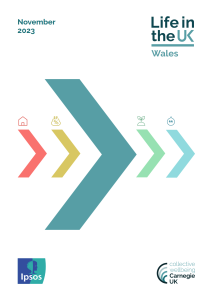- Democracy
- Economy
- Environment
- Evidence and reports
- Inequality
- Measuring wellbeing
- Society
- Jennifer Wallace and Amy Baker, Carnegie UK
- 21 November 2023
- ISBN: 978-1-912908-95-0
The Life in the UK index is designed to measure the collective wellbeing of the people of the UK, looking at social, economic, environmental, and democratic aspects of life. This publication outlines Wales’ scores for collective, social, economic, environmental and democratic wellbeing.
The research is based on a representative survey of 6,941 people from across the UK, including 531 from Wales. It presents key findings in relation to how different demographics are living across Wales.
- The collective wellbeing score for Wales in 2023 is 62 out of 100.
- People in Wales living in the most deprived areas have lower wellbeing across each theme.
- This research highlights that a large proportion of people in Wales are dissatisfied with job opportunities available locally.
- In a similar pattern to the rest of the UK, the research reveals a lack of trust in political systems and institutions in Wales.
The Life in the UK index was designed to provide an overall assessment of ‘how life is’. The overall Collective Wellbeing score is an average of the scores for each of the four wellbeing domains: social, economic, environmental and democratic. Higher scores indicate we found a higher level of wellbeing.
The 2023 publication outlines Wales’ scores for collective, social, economic, environmental and democratic wellbeing. The research is based on a representative survey of 6,941 people from across the UK, including 531 from Wales. It presents key findings in relation to how different demographics are living across Wales.
Overall, Wales’ collective wellbeing score is in line with that of the UK, at 62 out of a possible 100. The collective wellbeing score is the average of the scores for social, economic, environmental and democratic wellbeing and measures whether we are ‘living well together’. Wales’ overall collective wellbeing is also in line with other devolved nations in the UK.
On social wellbeing Wales scored 74 out of a possible 100. We found a 13-point gap in social wellbeing scores between disabled people (65) and non-disabled people (78). We also found an inverse linear relationship between area deprivation and social wellbeing: as area deprivation in Wales decreases, social wellbeing scores increase. The social wellbeing score for those living in the most deprived areas is 67 compared to 80 in the least deprived areas (a 13-point gap).
On economic wellbeing Wales scored 69 out of 100. We found that the economic wellbeing score for the lowest income group in Wales is 60 compared to 77 for the top income group (a 17-point gap). We also found a 24-point gap between the economic wellbeing scores of social housing tenants in Wales (49) and homeowners (73).
On environmental wellbeing Wales scored 66 out of 100. We found that environmental wellbeing in Wales is worse in areas of multiple deprivation, with a score of 57 in the highest areas of deprivation compared to 72 for those living in the least deprived areas (a 15-point gap). There is also an overall effect of age on environmental wellbeing in Wales with those aged 16 to 34 reporting a score for environmental wellbeing of 61 compared to 71 for those aged 55 and over.
On democratic wellbeing Wales scored just 39 out of 100. We found that 67% of people in Wales feel that they cannot influence decisions affecting Wales and 36% have low levels of trust in the Welsh Government.
Our 2023 findings for Wales indicate that the Welsh Government, public services boards, local councils and other bodies subject to the duties of the Well-being of Future Generations Act (2015) should work together to strengthen the implementation of a world-leading approach to the wellbeing of future and current generations. In particular, the Welsh Government, Public Service Boards and local councils must act to reduce the wellbeing gaps between socio-economic groups.
Political parties, Welsh Government and local councils must invest in fresh and sustained efforts to reverse the sense of alienation from local and national decision making and increase opportunities for meaningful involvement, as defined in the Five Ways of Working of the Future Generations Act.
Help us make the case for wellbeing policy
Keep in touch with Carnegie UK’s research and activities. Learn more about ways to get involved with our work.
"*" indicates required fields
